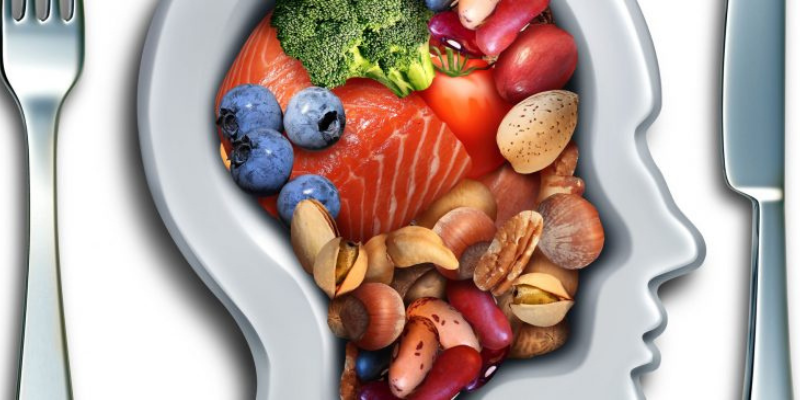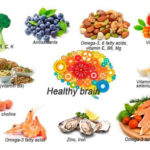The Link Between Diet and Memory: The Foods You Should Eat and Avoid for Better Memory Retention and Recall

Do you ever forget where you put your keys, struggle to remember someone’s name, or find yourself constantly misplacing things? If so, you’re not alone. Memory loss and forgetfulness are common issues for people of all ages. However, did you know that what you eat can have a significant impact on your memory? In this article, we’ll explore the link between diet and memory and provide you with tips on the foods you should eat and avoid for better memory retention and recall.
Introduction
As we age, our memory naturally declines, but it’s not just age that affects memory. Lifestyle choices, including diet, can also impact how well our brains function. Researchers have found that certain nutrients, like antioxidants and omega-3 fatty acids, can help protect our brains from damage and improve memory function.
The Best Foods for Memory Retention and Recall
- Blueberries – Blueberries are a great source of antioxidants, which protect the brain from damage caused by free radicals. Studies have found that blueberries can improve memory function and slow down age-related cognitive decline.
- Fatty Fish – Fatty fish like salmon, tuna, and sardines are rich in omega-3 fatty acids. Omega-3s are essential for brain function and can improve memory and mood.
- Leafy Greens – Leafy greens like spinach, kale, and broccoli are packed with vitamins and minerals that are essential for brain health. They’re also a great source of antioxidants.
- Nuts and Seeds – Nuts and seeds like almonds, walnuts, and pumpkin seeds are rich in vitamin E, which can help protect the brain from damage.
- Whole Grains – Whole grains like brown rice, quinoa, and whole wheat bread are a great source of complex carbohydrates. These carbs provide a steady stream of energy to the brain, improving memory function and concentration.
Unlock Your Brain’s Potential with Neurodrine: The All-Natural Way to Boost Mental Clarity
The Worst Foods for Memory Retention and Recall
- Processed Foods – Processed foods like chips, candy, and baked goods are high in sugar, unhealthy fats, and additives that can cause inflammation in the brain, leading to memory problems.
- Sugary Drinks – Sugary drinks like soda and energy drinks are high in sugar and can cause inflammation in the brain. They can also lead to a crash in energy levels, affecting memory function.
- Alcohol – Alcohol can impair memory function and lead to brain damage over time. Excessive alcohol consumption can also increase the risk of dementia.
- Trans Fats – Trans fats are found in fried foods, baked goods, and processed snacks. They can cause inflammation in the brain and have been linked to memory problems and cognitive decline.
- High-Sodium Foods – High-sodium foods like fast food and processed snacks can lead to high blood pressure, which can cause damage to blood vessels in the brain and affect memory function.
How to Incorporate Memory-Boosting Foods into Your Diet
Incorporating memory-boosting foods into your diet doesn’t have to be difficult. Here are a few simple tips to get you started:
- Start your day with a brain-boosting breakfast – Try oatmeal with blueberries, nuts, and seeds.
- Make a salad for lunch – Load up on leafy greens, veggies, and fatty fish like salmon.
- Snack on nuts and seeds – Keep a small bag of almonds or pumpkin seeds with you for a quick and healthy snack.
- Choose whole grains – Swap out white rice and bread for brown rice and whole wheat bread.
- Cook with healthy fats – Use olive oil or coconut oil instead of vegetable oil when cooking.
How Can My Diet Affect My Brain Health and Memory As I Age?

As we age, our brains go through a natural process of decline that can affect our memory and cognitive function. However, research has shown that our diet can play a significant role in maintaining brain health and potentially slowing down this decline. A diet that is high in nutrients such as antioxidants, omega-3 fatty acids, and B vitamins has been linked to improved cognitive function and memory.
In contrast, a diet that is high in saturated fats, refined sugars, and processed foods can have a negative impact on brain health and memory. These types of foods have been linked to inflammation and oxidative stress in the brain, which can contribute to cognitive decline. It’s important to remember that making dietary changes can be a powerful tool for maintaining brain health and memory as we age, and it’s never too late to start.
Are There Any Specific Nutrients Or Supplements That Can Enhance My Memory?
Certainly! When it comes to enhancing memory, there are several specific nutrients and supplements that have been shown to be beneficial. Omega-3 fatty acids, for example, found in fish and certain nuts and seeds, have been associated with improved cognitive function and memory. Vitamin E, which can be found in leafy greens, nuts, and seeds, has also been linked to better memory performance.
Additionally, herbs like ginkgo biloba and sage have been used for centuries to enhance memory and cognitive function. It’s important to note that while these nutrients and supplements may be helpful, they should not be used as a substitute for a healthy diet and lifestyle. As with any supplement, it’s also important to speak with a healthcare professional before adding them to your regimen.
Can a Poor Diet Negatively Affect My Memory and Cognitive Function?
Yes, a poor diet can definitely have negative effects on your memory and cognitive function. Consuming foods that are high in sugar, unhealthy fats, and processed ingredients can lead to inflammation in the body and brain, which can impact memory and cognitive function. In addition, a diet lacking in important nutrients such as vitamins, minerals, and omega-3 fatty acids can also contribute to cognitive decline.
Studies have shown that individuals who consume a diet high in fruits, vegetables, whole grains, and lean proteins have better cognitive function and memory compared to those who consume a diet high in processed and unhealthy foods. Therefore, it’s important to prioritize a healthy and balanced diet to support not only your physical health, but also your brain health and cognitive function.
Unlock Your Brain’s Potential with Neurodrine: The All-Natural Way to Boost Mental Clarity
What Role Does Hydration Play In Memory and Cognitive Function?

Staying hydrated is essential for maintaining good health, and it turns out that it can also play an important role in our memory and cognitive function. When we are dehydrated, our brain cells can become less effective at communicating with each other, which can lead to impaired cognitive performance, including memory problems.
Drinking enough water throughout the day can help to keep our brain cells functioning properly and improve our cognitive abilities. It’s recommended that adults drink at least eight cups of water per day, but this can vary depending on factors such as age, gender, and activity level. So, remember to stay hydrated and keep your brain functioning at its best!
How Much Of An Impact Does a Healthy Diet Have On Memory Improvement?
Maintaining a healthy diet has a significant impact on memory improvement. Certain foods and nutrients can support brain health and cognitive function, which can lead to better memory retention and recall. For example, omega-3 fatty acids found in fish and nuts have been shown to improve cognitive function and memory. Similarly, foods high in antioxidants, such as berries, can help protect the brain from oxidative stress and reduce the risk of age-related memory decline.
On the other hand, consuming a diet high in saturated and trans fats, sugar, and processed foods has been linked to cognitive decline and impaired memory function. Therefore, adopting a healthy diet that includes a variety of whole foods can be an effective strategy for improving memory and overall brain health.
How Can I Create a Balanced Diet That Supports My Memory and Cognitive Function?
Creating a balanced diet that supports memory and cognitive function can be achieved by incorporating a variety of nutrient-rich foods into your meals. Start by including whole foods such as fruits, vegetables, whole grains, lean proteins, and healthy fats. Specifically, foods high in B-vitamins, such as leafy greens, eggs, and legumes, have been shown to support brain health and cognitive function.
Additionally, foods high in antioxidants, such as berries and dark chocolate, can protect the brain from oxidative stress and reduce the risk of cognitive decline. It’s also important to stay hydrated by drinking plenty of water throughout the day, as dehydration can impair cognitive function and memory. Try to limit your intake of processed foods, sugary drinks, and foods high in saturated and trans fats, which can have negative effects on brain health.
Finally, consult with a registered dietitian to create a personalized and balanced diet plan that meets your individual needs and goals for optimal memory and cognitive function.
Are There Any Specific Diets, Such As the Mediterranean Diet, That Have Been Shown To Improve Memory?
Yes, certain diets have been shown to improve memory, including the Mediterranean diet. This diet is rich in fruits, vegetables, whole grains, fish, and healthy fats, and has been linked to numerous health benefits, including improved cognitive function and memory. Some of the ways the Mediterranean diet may benefit memory include:
- The high intake of fruits and vegetables provides a variety of nutrients and antioxidants that can protect the brain from damage and inflammation.
- The consumption of fish, which is rich in omega-3 fatty acids, has been shown to improve cognitive function and memory.
- The inclusion of healthy fats, such as olive oil and nuts, can provide the brain with essential nutrients that support cognitive function and memory.
- The diet is low in saturated and trans fats, which have been linked to cognitive decline and memory impairment.
- The Mediterranean diet is also associated with a reduced risk of age-related memory decline and neurodegenerative diseases such as Alzheimer’s.
Overall, adopting a Mediterranean-style diet can be an effective way to improve memory and promote overall brain health.
Can Making Dietary Changes Help To Prevent Or Manage Conditions That Can Affect Memory, Such As Alzheimer’s Disease?
Yes, making dietary changes can be an effective way to prevent or manage conditions that can affect memory, such as Alzheimer’s disease. Research has shown that adopting a healthy diet, such as the Mediterranean diet, can help reduce the risk of developing Alzheimer’s disease and other forms of dementia. Additionally, some studies have shown that making dietary changes may help manage symptoms in individuals who already have Alzheimer’s disease. Some of the ways that dietary changes can help prevent or manage conditions that affect memory include:
- Reducing inflammation: A diet rich in fruits, vegetables, and whole grains can help reduce inflammation in the body and brain, which may contribute to the development of Alzheimer’s disease.
- Supporting brain health: Certain nutrients and foods, such as omega-3 fatty acids, antioxidants, and B vitamins, can support brain health and cognitive function, which may help prevent or manage memory-related conditions.
- Controlling blood sugar: High blood sugar levels have been linked to an increased risk of Alzheimer’s disease, so controlling blood sugar through diet can help reduce the risk.
- Reducing the intake of saturated and trans fats: These types of fats have been linked to cognitive decline and memory impairment, so reducing their intake can help promote brain health.
Overall, making dietary changes can be an important part of a comprehensive approach to preventing or managing conditions that affect memory, such as Alzheimer’s disease.
Frequently Asked Questions
Q: Can taking supplements improve memory function?
A: While some supplements claim to improve memory function, it’s best to get your nutrients from whole foods. A balanced diet that includes memory-boosting foods is the best way to improve your memory function.
Q: How much fatty fish should I eat?
A: The American Heart Association recommends eating fatty fish at least twice a week for optimal health benefits.
Q: Are all processed foods bad for memory?
A: Not all processed foods are bad for memory, but many are high in sugar, unhealthy fats, and additives that can cause inflammation in the brain. It’s best to limit your intake of processed foods and choose whole foods instead.
Q: Can alcohol improve memory function in moderation?
A: While studies have shown that moderate alcohol consumption can have some health benefits, excessive alcohol consumption can impair memory function and increase the risk of dementia.
Q: Are there any other lifestyle factors that can improve memory function?
A: Exercise, sleep, and stress management are all important factors that can improve memory function. By getting regular exercise, getting enough sleep, and managing stress, you can boost your brain health and improve your memory function.
The Link Between Diet and Memory Conclusion
In conclusion, what you eat can have a significant impact on your memory. By incorporating memory-boosting foods into your diet and avoiding foods that can harm your brain, you can improve your memory retention and recall. Blueberries, fatty fish, leafy greens, nuts and seeds, and whole grains are all great options for memory-boosting foods. On the other hand, processed foods, sugary drinks, alcohol, trans fats, and high-sodium foods should be avoided.
Remember, a healthy diet isn’t just good for your body, but it’s also good for your brain. By making simple changes to your diet, you can boost your memory function and protect your brain from damage.




